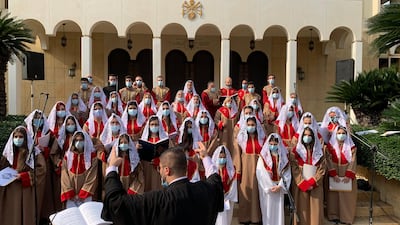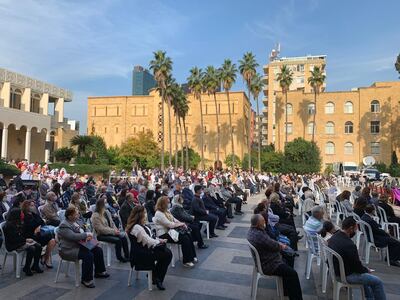Hundreds of worshippers gathered on Wednesday for a muted Christmas celebration at Lebanon’s biggest Armenian church.
A day before the country went into another lockdown, the Catholicosate of Cilicia, in Beirut's Antelias suburb, welcomed worshippers.
It was the Armenian community’s biggest religious gathering since a deadly explosion hit Beirut's port in August and war erupted between Armenia and Azerbaijan the very next month.
The usual midnight service was cancelled due to the pandemic but families gathered in front of the church for a mid-day mass in the open, with empty chairs separating attendees to maintain Covid-19 safety precautions.
Volunteers handed out face masks while worshippers, dressed in their Sunday best, took pictures in the sunny courtyard.
Armenians, who represent roughly four per cent of Lebanon's population, celebrate Christmas on January 6 instead of December 25. Both dates are national holidays.
Arshag Kokonian, 55, said the festive season this year has given his community hope and strength as both Lebanon and Armenia face immense challenges.
“This was a difficult year for the Lebanese in general and Armenians in particular,” Mr Kokonian said. “Difficult days lie ahead but the birth of Christ gives us hope that peace will come to Lebanon and Armenia and that justice will never die.”
The celebration follows the five-month anniversary of the port explosion, which left more than 200 people dead and destroyed vast parts of the capital.
The blast compounded an economic downturn already worsened by the Covid-19 pandemic and a year-long financial crisis.
Vartan Balikian, 48, said his faith had given him solace even as the economic situation deteriorated over the past few years.
"Every year we wish for things to get better and it doesn't work out. The situation is getting more and more difficult," he tells The National. "But we place all our hope in God, He gives us strength."
Less than two months after the Beirut explosion, war erupted between Armenia and Azerbaijan over the disputed territory of Nagorno-Karabakh, which Armenians refer to as Artsakh.
The conflict resulted in mass displacement and casualties on both sides.
Moushir Donabedian, an elderly Syrian-Armenian man from the Kurdish city of Qamishli came to Beirut to celebrate Christmas with his children, who live in Lebanon.
Mr Donabedian condemned Turkey’s involvement in the conflict alongside Azerbaijan. He said Armenians felt abandoned by the international community.
“This year was particularly difficult especially because of the Turkish war on Armenia. I hope the new year brings better days to everyone.”
Despite mounting difficulties at home in Lebanon and in their ancestral homeland of Armenia, worshippers said they were happy to reunite with their family and friends before the new lockdown.
Sevan Garabedian, 53, told The National this year's celebrations had filled her with hope.
“I am glad we were finally able to go to Church and see the beautiful faces of our loved ones and friends. Hopefully more cheerful Christmases will come.”


